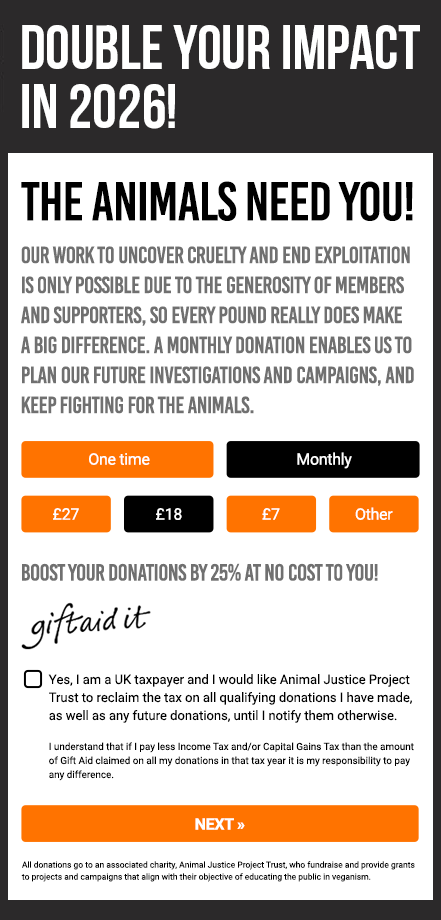
Respect All Life
The impacts of pig farming

Blog written by Victoria Smith, volunteer blog writer
In January, Animal Justice Project encouraged supporters to lodge their objections to an application made by Cranswick PLC to construct a new ‘megafarm’ in Norfolk, capable of housing 714,000 chickens and 14,000 pigs.
West Norfolk Council received more than 15,500 objections to the project, which, whilst a huge number, is unsurprising. Cranswick suggests that this project would ‘create a sustainable and modern farm’, but such a thing is impossible. There’s no way that today’s industrial process of raising animals for food can be done in a way that’s anything other than environmentally destructive and dangerous to human health.
One study found that ‘livestock production contributes an estimated 14-30% of all human-made greenhouse gas emissions and is the largest source of anthropogenic methane emissions’. In his book We Are the Weather, Jonathan Safran Foer writes that the concentrations of these emissions grew six times faster between ‘the advent of factory farming in the 1960s and 1999 … than they had over any previous forty-year period during the last two thousand years’. The meat industry is the single biggest cause of deforestation globally, pollutes water, causes desertification and contributes to biodiversity loss. Logic would suggest that considering this overwhelming collection of negatives, we shouldn’t be approving any new sites for animal agriculture. However intensive farms are actually on the rise, with a 12% increase in the UK between 2016-2023.
Greenhouse gas emissions, desertification and biodiversity loss can seem quite abstract issues that many struggle to relate to their everyday lives, yet as argued by the Cranswick Objection Group, set up in opposition to the proposed Norfolk farm, there are numerous concerns that feel much closer to home for communities who live in the shadows of factory farms.

Noise and environmental pollution from traffic
Farms of this size are often located in remote rural areas, which means everything going to and from them needs to be transported along narrow country lanes, not built for HGVs. The transportation of food, machinery, supplies, and ultimately the animals themselves, creates a huge strain on local infrastructure, as well as the added pollution of these vehicles, and the disruptive noise levels in quiet areas that are often home to an array of wildlife.
Air Pollution from pig farms
As well as vehicular air pollution from a site of this size, the animals themselves are a cause for concern when it comes to air quality. This number of pigs would produce around 82 tonnes of manure per day, and the chickens, 77 tonnes per day. The toxic gasses and particulate matter (including dust and other airborne particles) arising from this is a genuine health concern to local residents. This may sound sensational, but a 2021 study conducted in the United States found that almost 13,000 deaths per year could be attributed to air pollution from animal agriculture. The breakdown of slurry – a mixture mostly consisting of faeces, urine and water – is not only responsible for greenhouse gas emissions, but is also a source of ammonia emissions, which can cause serious respiratory issues. A resident who lives 100 metres from a pig farm in Denmark, and was interviewed by Greenpeace, tells of wearing a facemask outside her house. “The smell is so awful that it makes me feel sick. My head aches and my eyes are red and swollen. I feel that our lives are destroyed because of the smell, noise and dust from the farm”.

River and Soil Pollution from slurry run-off
Slurry doesn’t only cause air pollution. Commonly used as a natural fertiliser, when badly managed it can actually cause water and soil pollution, as excess nutrients contribute to eutrophication as they run off the land and into water bodies. There’s been a lot of press surrounding the pollution of rivers in the UK over the last couple of years – but few probably know that agriculture is the number one pollutant of our rivers. A 2024 report by the Soil Association found that if the government doesn't put a stop to new chicken farms, rivers in at least 7 different counties are at risk of becoming dead zones; completely devoid of any natural life. This has already occurred in the River Wye, where large stretches have been ravaged by phosphate pollution, (a result of slurry run-off), causing algal blooms that have suffocated the plants, fishes, and other free-living beings that live within it.
Zoonotic disease outbreaks on pig farms
Intensive farming plays with the risks of zoonotic disease and future pandemics. Both Swine Flu and Avian Flu made the jump from animals to humans, and the nature of intensive farming makes these confined spaces the ideal breeding ground for viruses. Scientists warn that ‘the emergence of zoonotic infections that can develop into pathogens of pandemic potential is a major concern for public health’.
Concerns for pigs who are farmed
On top of these concerns for human health and the environment, are also, of course, the concerns that arise from keeping such a vast scale of animals in such inadequately small, unnatural and restrictive spaces. As previously revealed by Animal Justice Project, Cranswick has a track record of abysmal conditions and widespread suffering across their sites.

In all, it’s unsurprising that Norfolk residents are horrified by Cranswick’s plans for their neighbourhood. Over a billion animals are confined in intensive farms in the UK every year. In contrast to what advertising and marketing would have us believe, that’s the majority of animals farmed in Great Britain.
As always,
For the animals.

.png)


.png)




.webp)








.png)